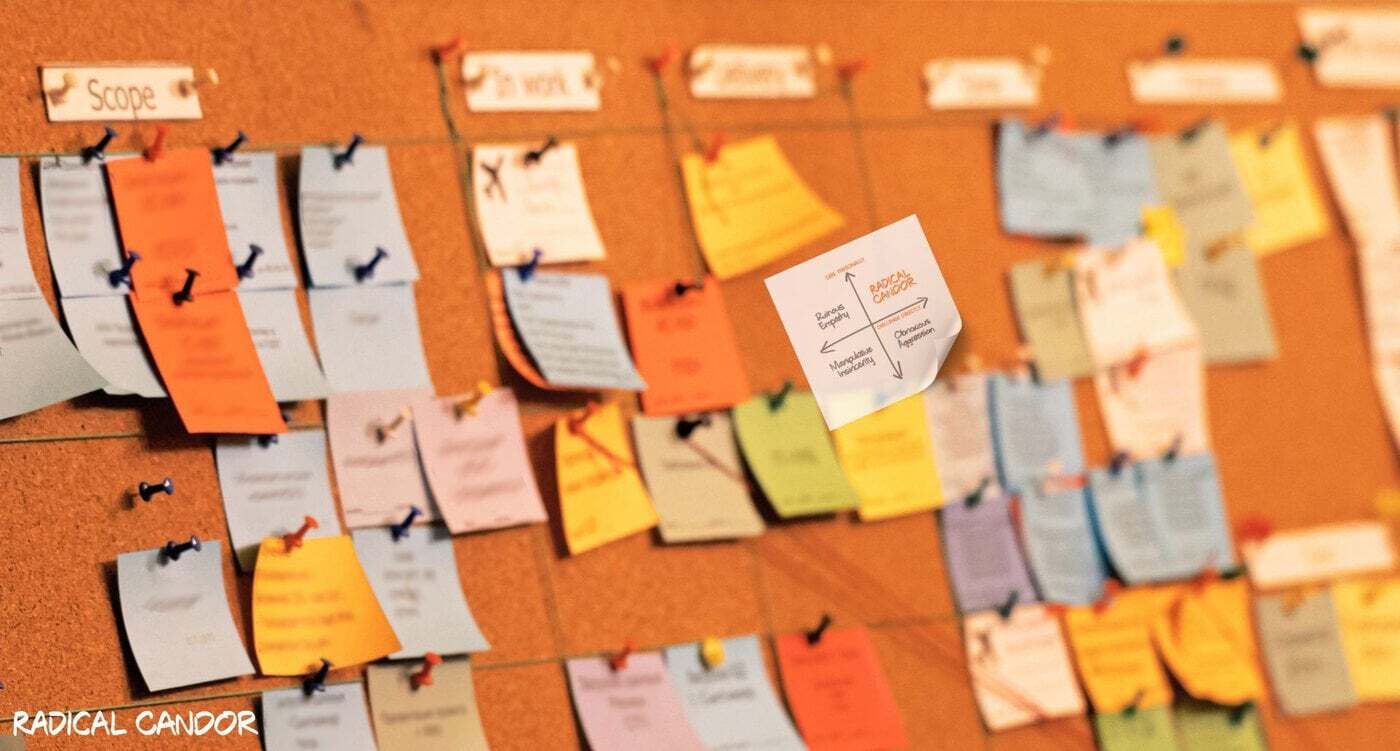Leaders Who Embrace Feedback Training Have Happier, Healthier & More Productive Teams
If your feedback has ever failed or fallen flat, you’re in good company. Feedback training for leaders is one of the most overlooked aspects of...
6 min read
Radical Candor Nov 14, 2024 2:31:32 PM

By Nahla Davies, a software developer and tech writer. Before devoting her work full-time to technical writing, she managed—among other intriguing things—to serve as a lead programmer at an Inc. 5,000 experiential branding organization whose clients include Samsung, Time Warner, Netflix, and Sony.
Imagine a workplace where you can freely express your thoughts and concerns without fear of retaliation. A place where giving and receiving honest feedback is not just accepted but actively encouraged.
Sounds like a dream, doesn't it? Well, that's precisely what Radical Candor aims to achieve.
Radical Candor can be a game changer in the world of Agile methodologies, which thrives on adaptability, communication, and collaboration. Integrating Radical Candor into Agile practices lets you create a team environment that’s not only more transparent and adaptive but also high-performing.
The first dimension, Care Personally, encourages leaders and team members to build strong relationships based on empathy, trust, and a genuine interest in each other's personal and professional well-being and growth.
By truly caring for their colleagues as individuals, teams create an environment where feedback is perceived as constructive rather than personal attacks.
The second dimension, Challenge Directly, involves the willingness to have tough conversations and provide feedback without sugarcoating or avoiding difficult topics. It's about challenging ideas, behaviors, and processes respectfully but directly, with the goal of driving continuous improvement and addressing potential issues before they escalate.
While Radical Candor encourages direct communication and genuine caring, it's crucial to avoid falling into the traps of Obnoxious Aggression or Ruinous Empathy. Obnoxious Aggression occurs when feedback is delivered in an aggressive, hurtful, or disrespectful manner.
Conversely, Ruinous Empathy involves withholding truthful feedback out of the fear of causing discomfort. Both extremes can be detrimental to team dynamics and undermine the principles of Radical Candor.

Agile methodologies are built upon a foundation of iterative development, continuous feedback, and collaboration. By weaving the principles of Radical Candor into these core agile rituals, teams can unlock new levels of transparency, accountability, and, ultimately, success.
"Adopting agile methodologies often requires a significant shift in organizational mindset and behaviour. Radical Candor can foster a supportive environment where team members feel comfortable discussing challenges and giving each other constructive feedback," Hrishikesh Karekar, author of Perspectives on Agility: Practical insights from the trenches, wrote on Medium.
"It is essential for them to have strong bonds so that they care personally yet have the right culture to challenge each other when needed for the greater good... By fostering an environment where team members feel comfortable giving and receiving feedback, Radical Candor helps teams work more efficiently and effectively."
During stand-ups, team members should feel empowered to candidly share their struggles or concerns without fear of judgment. This openness allows for the timely identification of potential roadblocks and enables the team to find solutions collectively.
Moreover, by providing direct yet caring feedback, teammates can offer guidance, support, and alternative perspectives, promoting a collaborative environment where everyone's contributions are valued.
Additionally, stand-ups present an opportunity to address challenges with openness. Rather than glossing over issues or assigning blame, team members should feel comfortable openly discussing the root causes and potential resolutions.
This level of transparency promotes accountability and enables the team to learn from their experiences and continuously improve their processes.
During retrospectives, team members should feel safe to provide honest feedback on what worked well and what could be improved. This unrestrained exchange of perspectives allows for a deeper understanding of the team's strengths and weaknesses, enabling them to make informed decisions about process adjustments and team dynamics.
Moreover, Radical Candor in retrospectives fosters a continuous improvement mindset. By openly discussing challenges and successes, teams can identify opportunities for growth and development, both individually and collectively.
Radical Candor is particularly helpful to engineering teams because of this hectic process, leaders at ZenHub told Radical Candor.
"Being able to give quick, effective feedback without damaging relationships is important for building a high-performing team, and Radical Candor makes that possible. People say what they think instead of letting it build up, unspoken, over time."
Their approach balances efficiency with growth: They quickly identify problems, but more importantly, they turn code reviews into teaching moments. Instead of just flagging errors, reviewers explain in depth why certain approaches work better.
This transforms what could be simple error-catching into real mentorship. It's so effective that even their interns end up improving senior developers' code — something that's rare in the industry.
During sprint planning, team members should feel comfortable engaging in open and sincere discussions about priorities, capacity, and potential dependencies or risks. Creating an environment of openness allows teams to avoid unrealistic commitments or overlooked dependencies, which can lead to missed deadlines or suboptimal outcomes.
Additionally, Radical Candor during sprint planning encourages team members to hold each other accountable. By having candid conversations about individual responsibilities and expectations, teams can establish a shared understanding of what needs to be accomplished and who is responsible for specific tasks.
Mauricio Robles, who develops agile coaches, noticed a recurring theme with one of her clients. His feedback often came across as too harsh or too vague and this caused significant project delays. Robles decided to introduce her client to Radical Candor’s Get Stuff Done Wheel.
“The impact was immediate and profound. For the first time, the director began to see where communication breakdowns were occurring,” Robles writes on the Agile506 blog.
“By actively listening, he could clarify misunderstandings and facilitate more meaningful debates. Decisions were made with greater consensus, and the team felt more invested in the outcomes.”
Additionally, leaders play a crucial role in setting the tone for how team members receive feedback. When leaders embrace and respond positively to feedback from employees, they cultivate an atmosphere of trust and psychological safety, encouraging others to follow suit.
Effective communication and collaboration tools are vital in supporting Radical Candor within Agile teams, so leaders must also do everything in their power to make those two elements as simple as possible. This might entail investing in new collaboration software, using simple solutions like QR codes for registration at virtual daily scrums, or even utilizing tools with features like anonymous feedback channels or real-time polling.
Without this sense of psychological safety, it’s impossible to create an environment where candid feedback is welcomed and viewed as a catalyst for growth and improvement.
Building psychological safety requires intentional effort from both leaders and team members. Regular team-building activities, normalizing learning from mistakes, and active efforts to create an inclusive and respectful team culture can all contribute to an environment where individuals feel safe to challenge ideas and offer honest feedback.
While the concept of Radical Candor may seem straightforward, implementing it effectively can be challenging. Providing training and guidance on how to give and receive feedback in a caring yet direct manner is crucial if the principles of Radical Candor are to be applied consistently and effectively.
Radical Candor offers in-personal, virtual, digital, and licensable feedback training for teams of all sizes anywhere in the world.
Additionally, providing practical examples and role-playing scenarios can help team members develop the skills necessary to navigate difficult conversations and deliver feedback that's kind, clear, specific, and sincere.
Additionally, establishing clear guidelines and protocols for providing feedback can help ensure a consistent approach across the team.
These guidelines should outline the appropriate channels for giving feedback, the tone and language to be used, and the expectation that feedback should be specific, actionable, and focused on continuous improvement.
Integrating Radical Candor into Agile methodologies can transform how teams communicate and collaborate, leading to a more transparent, adaptive, and high-performing work environment.
By balancing personal care with direct challenge, teams can build trust, enhance accountability, and foster continuous improvement. This approach not only improves team dynamics but also drives innovation and effective problem-solving.
***
Nahla Davies is a software developer and tech writer. Before devoting her work full-time to technical writing, she managed—among other intriguing things—to serve as a lead programmer at an Inc. 5,000 experiential branding organization whose clients include Samsung, Time Warner, Netflix, and Sony.
————————————————————————————————————————————————————————————–
If you understand the importance of feedback in the workplace, then you need The Feedback Loop (think Groundhog Day meets The Office), a 5-episode workplace comedy series starring David Alan Grier that brings to life Radical Candor’s simple framework for navigating candid conversations.
We’re offering Radical Candor readers 10% off the self-paced e-course. Follow this link and enter the promo code FEEDBACK at checkout.

If your feedback has ever failed or fallen flat, you’re in good company. Feedback training for leaders is one of the most overlooked aspects of...

Why is communication important in the workplace, asked no one ever. The importance of communication in the workplace between people at all levels...

Creating a culture of feedback at work helps teams thrive, companies retain top talent and individuals grow in their careers. Gone are the days when...